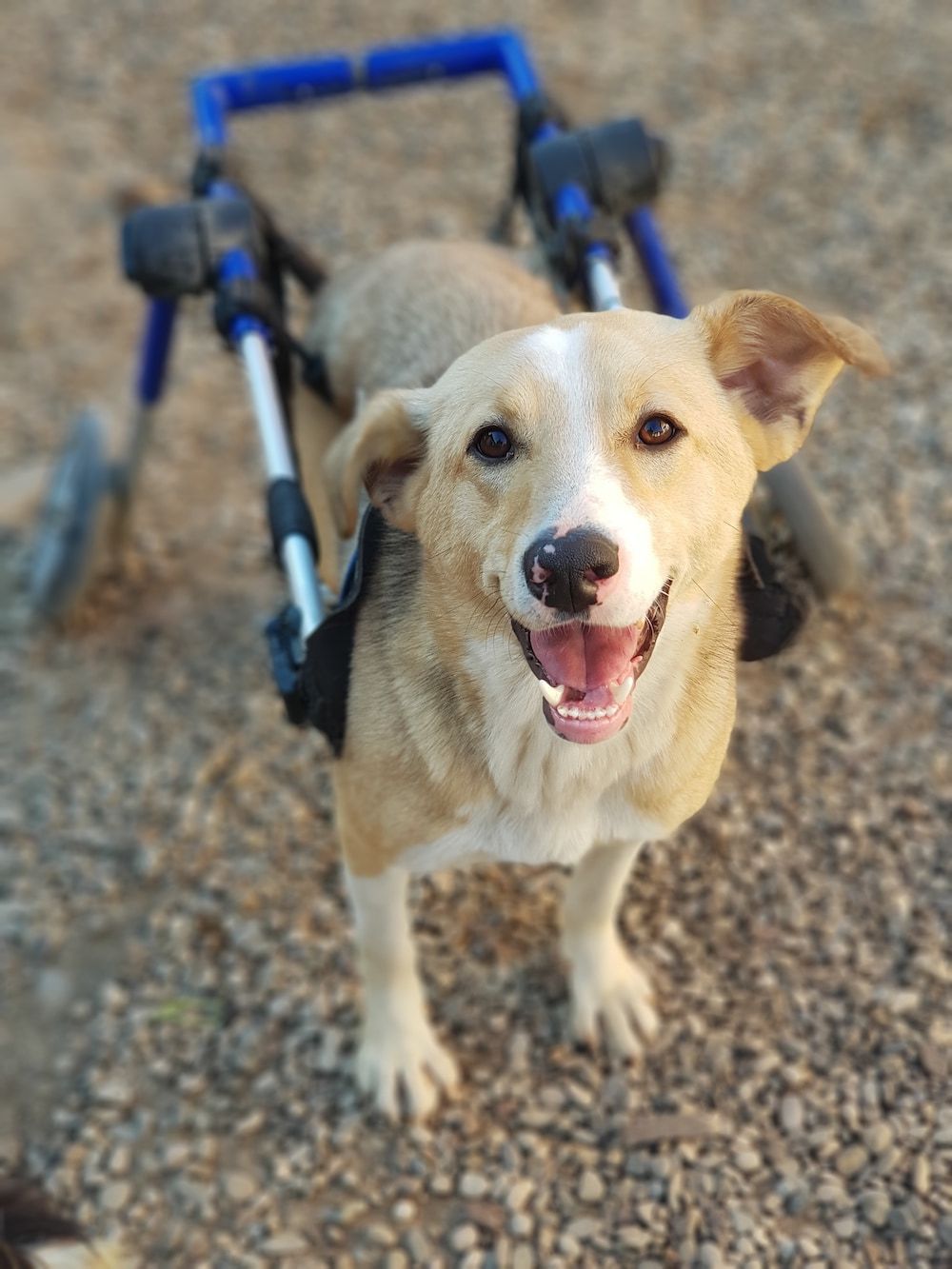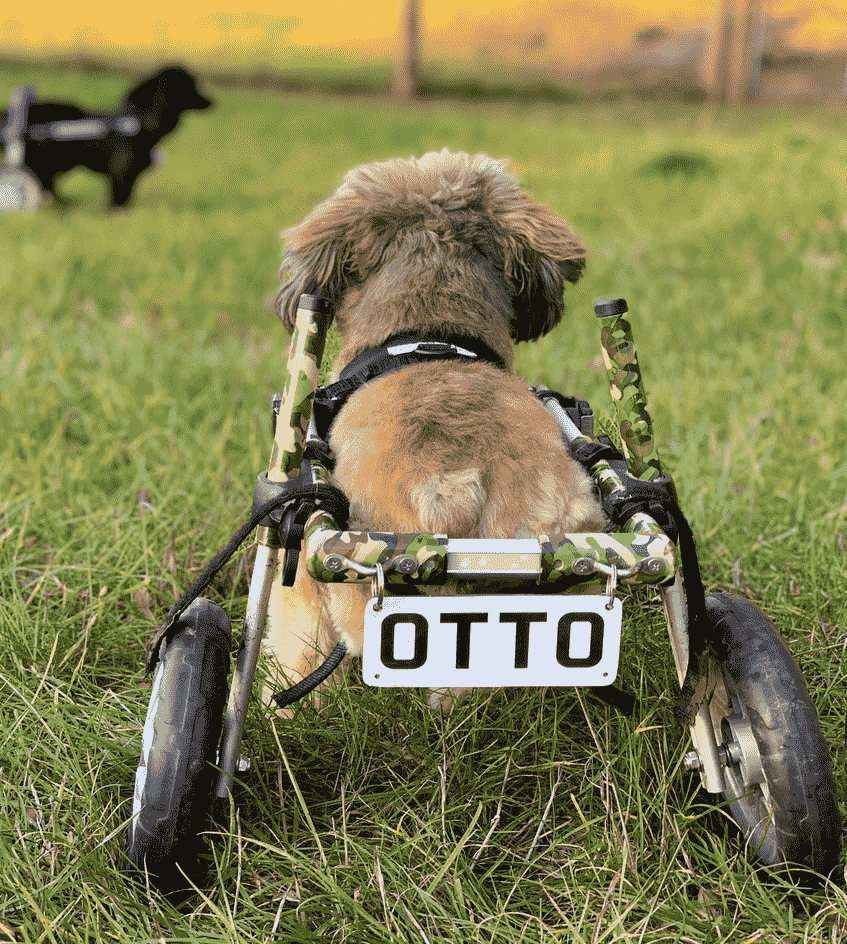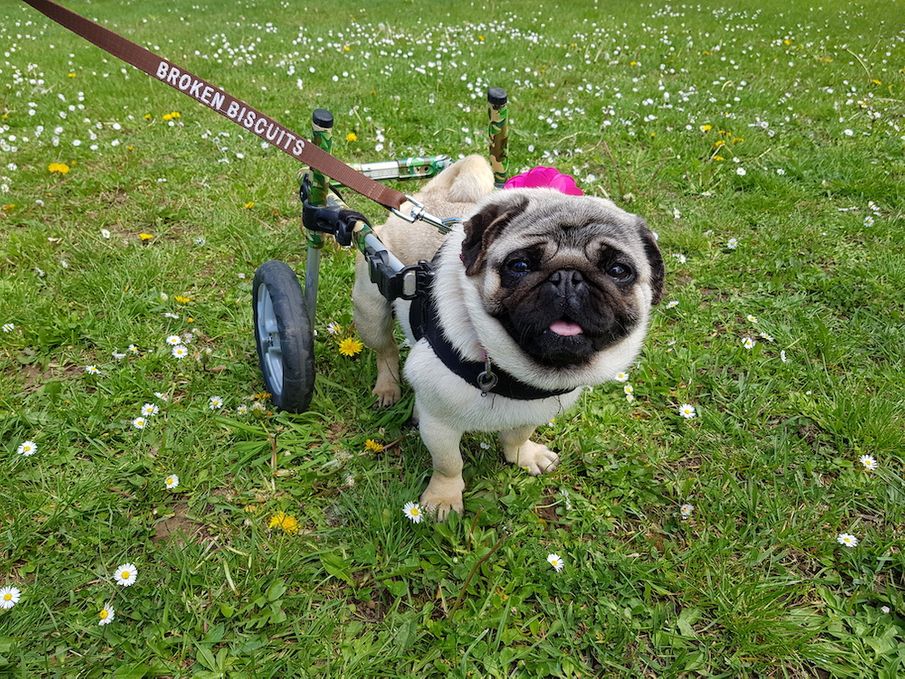Dogs, as any owner will undoubtedly tell you, bring boundless joy to the lives of those who welcome them into their families. And yet countless dogs come to harm – from illness, road accidents, or at the hands of humans – only to then find themselves left behind when it comes to being rehomed.
Broken Biscuits is helping these dogs – from what started as a series of random acts of kindness to then becoming a charity – by providing custom-made wheelchairs, rehabilitation funding, and help with rehoming. It’s a tail not to be missed
Dogs Trust estimates that there are more than 65,000 stray dogs in the UK, but worldwide the figures are in the millions. After seeing the number of strays on the streets during a holiday to Europe in 2012, Cassandra Carney and her husband, Tim Giles, decided they were going to do something about it.
They began their mission by supporting spaying and neutering organisations, but soon were moved to help the disabled dogs that were being left in shelters; finding dog mobility companies, and buying and sending wheelchairs to centres.
“Back then it was the Broken Biscuits Craft Club, and my friends and family were just baking cakes, knitting things, and doing stalls at craft fairs to cover costs,” Cassandra explains. “So it was all really small. It wasn’t ever meant to be a massive charity, it was just me and my friends.”

But it didn’t stay small and local for long. Cassandra was sharing photos of the dogs in their wheelchairs on social media and, as they spread across the internet, people from all over the country got in touch to offer their help. So the Broken Biscuits Craft Club became Broken Biscuits – a charity and disabled animal advocacy organisation, devoted to giving dogs that have been left behind the freedom to live a limitless life.
Homeward bound
From their home in Surrey, that they share with their daughter Lily and six rescue dogs of their own, Cassandra and Tim work on three core pillars: rescue, rehabilitate, and rehome.
Their mission begins with supporting dogs in rescue centres, continues as they fund and provide mobility equipment, and concludes only when the dogs are settled in their forever-homes.
“We were really chuffed to see the support the dogs got from people all over the world,” says Cassandra. “But most importantly, the change in each dog’s mood was instantly visible. The frames didn’t just give them back mobility, but also the freedom to choose where to go. This desire to be able to do as you wish is interspecific; we all want to be able to choose which direction we walk in, and what we do next.
“I remember seeing our own double amputee, Otto, chasing a bee for the first time after getting his wheelchair,” Cassandra continues. “He was ecstatic, jumping and howling, ears all a-flapping! I’d never seen him so enthusiastic about something before, and we had showered him with gifts and love.”
But the dogs aren’t the only ones who get a new lease on life. From what Cassandra has seen, as she matches dog to owner, the joy and freedom that is granted to the dog continues in the lives of owners.
By your side
“In many situations, gifting the pet-parent with a wheelchair for their pet means that they get out of the house more,” Cassandra explains. “We’ve had some really amazing calls from people who were recipients of our Norman Guntrip funding – which provides the wheelchairs – saying what a difference the frames have made to their own wellbeing.”
We all want to be able to choose which direction we walk in, and what we do next
As Cassandra and countless studies have found, owning a pet can have an incredible effect on our wellbeing. They become a reason to connect to others, breaking down the barriers that we so often build up around us.
“Sharing your life with a dog, or two, is a total blessing. They bring our family truckloads of joy,” says Cassandra. “There isn’t a day that goes by where Otto or Coco hasn’t made us cry with laughter; they bring such happiness to our lives.”
Dog-owner matches, like the ones Cassandra describes, don’t happen by accident, and in order to get the perfect pairing, Broken Biscuits have a very personal approach to the rehoming process. The dogs stay under Broken Biscuits’ care for at least a year before they are available for adoption. “In that time, we get to know the dogs, so then we know the perfect person for them,” Cassandra explains. “I’m in no hurry to just drop them in somebody’s lap. The balance has got to be about the personality.”
Once the match has been made, Cassandra’s husband Tim drives the dogs to their new families himself. “Even if it’s in Scotland!” Cassandra adds. “He loves it, because he gets a couple of nights stay in a hotel on the way up.”
Testament to the kindness the organisation was built upon, Cassandra tells us that the people who adopt from Broken Biscuits don’t just sign on the dotted line and then move on, they become lifelong friends. They stay in touch, exchanging stories about the quirks of life with a disabled pet (“We talk a lot about pooping and weeing!”), moulding a sympathetic, supportive community.
And this crafting of a community is all part of Cassandra and Tim’s big-picture plan, where they’re challenging the barriers that leave disabled pets in rescue centres – something they do with their delightfully-named advocacy scheme: Roll Model. Taking three of their own dogs, Otto, Coco and Jasper, the team visit universities, schools, and clubs to open discussion and bring disabled animals into the public eye.

“The dogs adore the attention, and it gives kids and adults an opportunity to digest what a body without a leg is like,” says Cassandra. “They can ask anything about how they move, or how they do day-to-day activities like toileting, and we can laugh about the questions with no judgement or anxiety.”
Underdog
At the heart of it, this is what Cassadra and Tim want to tackle with Broken Biscuits: the unanswered questions that prevent people from adopting disabled animals, perhaps because of misconceptions about their quality of life, or maybe just a fear of the unknown.
“Feeling like you don’t fit in, are overlooked, or left behind – like broken biscuits on a plate – hurts,” Cassandra explains. “We all want to be loved, and seeing the animals we take into care adapt and overcome such adversity is inspirational.”
Dog-lover or not, the message is clear: with open-mindedness, love, and devotion, journeys through adversity aren’t just aspirational, they’re possible and monumental. Joy is a give-and-take business, and for Cassandra, Tim, and everyone else involved in Broken Biscuits, that joy can be found and nurtured in their vibrant, nifty, one-of-a-kind, unconditionally-loving canine friends.
For more about Broken Biscuits and to donate, visit brokenbiscuits.org


Comments